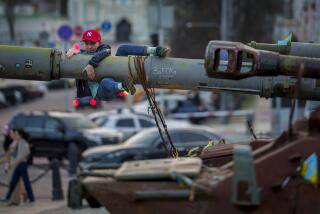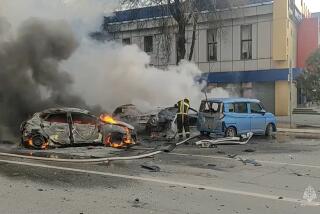Truck bomber targets police in Iraqi oil hub
- Share via
BAGHDAD — A truck bomb killed at least six police officers and wounded 16 people Saturday in the northern oil hub of Baiji, the second attack in two days to take aim at Iraq’s most lucrative industry.
The blast in the city about 125 miles north of Baghdad was also the latest reminder of an apparent move by insurgents to step up attacks in northern regions after being pushed out of the capital by an increased troop presence.
Although attacks on civilians nationwide have fallen about 55% since June, according to U.S. military figures, the level of attacks in Diyala and Salahuddin provinces just north of Baghdad has remained the same or increased.
The latest attack was carried out by a suicide bomber in Baiji, home to thousands of employees of Iraq’s largest oil refinery. Two pipelines cross through the city, one carrying oil from the Kirkuk field to Baiji for refining, and another carrying oil north into Turkey. The refinery handles about 300,000 barrels a day from Kirkuk, according to Iraq’s Oil Ministry.
Because of its strategic importance, the city is a frequent target of insurgents, as are the pipelines. In June, 18 people died when a suicide bomber struck Baiji’s police headquarters. An August attack at another Baiji police post killed 24 people.
Since the war began in March 2003, more than 460 attacks have been carried out against Iraq’s oil installations or industry employees, according to the Institute for the Analysis of Global Security, which monitors security issues related to energy. These have included scores of blasts along pipelines, including one Friday about 10 miles northeast of Baiji that sent oil spilling into the Tigris River.
The attacks have left Iraq’s oil industry struggling to increase exports, on which 90% of the country’s revenue is based. Before the war, Iraq exported about 2.3 million barrels per day. Last year, it averaged 1.6 million barrels daily.
In an interview Friday on Iraq’s Al Hurra television, Oil Minister Hussein Shahristani said exports had reached 2 million barrels a day recently.
“Thank God for those high oil prices,” he said.
Oil analysts and U.S. officials, however, say that until Iraq’s government passes a bill overseeing management of the country’s oil fields and establishing a system for divvying oil revenue, the industry will remain stunted by the lack of investment. Shahristani alluded to that legislation in the interview, saying the most important thing in the industry is “full national control over the oil resources,” including guaranteeing employment for Iraqis.
Shahristani took aim at the semiautonomous Kurdistan region in the north, which has passed its own oil legislation and has signed contracts with foreign oil companies. The move has set the stage for a showdown in Iraq’s parliament between Kurdish lawmakers and others who see the Kurdistan legislation as undermining Iraq’s national interests.
U.S. officials have said passage of national oil legislation must be a priority for the Iraqi parliament if distrust among ethnic groups and regions is to be overcome. There is no sign, however, that the oil bill is close to passage.
The Baiji assault came a day after at least 24 people died in attacks north of the capital.
Also Saturday, U.S. military officials said they had killed 12 alleged Al Qaeda in Iraq insurgents in raids south and northeast of the capital.
The country’s Sunni Arab vice president, meanwhile, was quoted Saturday as blaming the government for ongoing political discord, which U.S. officials warn could lead to increased violence. Tariq Hashimi made his comments in Bahrain, where he was attending a security conference, the Reuters news agency reported.
“The result of this political process is now a disputable constitution, a weak government and incoherent parliament,” Reuters quoted Hashimi as saying.
U.S. diplomats and military leaders have warned that unless political leaders end their public battles and display evidence of reconciliation, sectarian violence will surge back.
--
--
A special correspondent in Tikrit contributed to this report.
More to Read
Sign up for Essential California
The most important California stories and recommendations in your inbox every morning.
You may occasionally receive promotional content from the Los Angeles Times.













